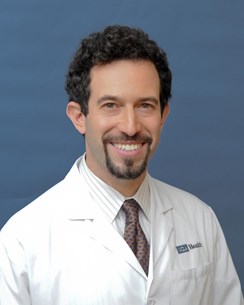Meeting
2018 ASCO Annual Meeting

UCLA Medical Center, Los Angeles, CA
Jonathan Wade Goldman , Afshin Dowlati , Scott Joseph Antonia , John J. Nemunaitis , Marcus O. Butler , Neil Howard Segal , Pamela Ann Smith , Jared Weiss , Dan Paul Zandberg , Feng Xiao , Natasha Angra , Shaad Essa Abdullah , Shirish M. Gadgeel
Background: SCLC is an aggressive lung cancer with high rate of relapse following initial treatment; immunotherapy holds potential as a novel treatment option for this disease. The anti-PD-L1 antibody durvalumab has demonstrated clinical activity with manageable toxicity in several tumor types, including NSCLC. Here we report on the SCLC expansion cohort of a phase 1/2 study of durvalumab monotherapy. Methods: Patients with pretreated ED-SCLC, ECOG PS 0-1, regardless of PD-L1 expression, received durvalumab 10 mg/kg every 2 weeks for up to 12 months. The primary objective was to determine the safety profile; antitumor activity was evaluated using investigator-assessed RECIST v1.1. Results: As of 16 October 2017, 21 patients with ED-SCLC (median age 65.0 y, 62% male, 91% ECOG PS 1, 90% current/former smokers) were treated with durvalumab, median 3 cycles, median duration of follow-up 36.4 months (range 1.4–37.9). 20 patients (95.2%) received prior anti-cancer therapy (median, 2 lines). 7 patients (33.3%) had treatment-related AEs, all were grade 1 or 2; the most common were nausea, fatigue, and rash maculo-papular (each 9.5%). There were no treatment-related AEs leading to discontinuation and no treatment-related deaths. Confirmed ORR was 9.5% (2 PR; 95% CI 1.2–30.4) and DCR24 was 14.3% (95% CI 3.0–36.3). Duration of response was 14.6 months for one patient (treatment-naïve), and 29.5+ months for the other patient (platinum refractory with 3 prior lines of therapy), who continued to maintain response 25.5 months after completing protocol-defined initial treatment with durvalumab. Median PFS was 1.5 months (95% CI 0.9–1.8), median OS was 4.8 months (95% CI 1.3–10.4), and 12-month OS rate was 27.6% (95% CI 10.2–48.4). Conclusions: Consistent with studies in other tumor types and with other anti-PD-1/PD-L1 therapies, durvalumab monotherapy demonstrates durable clinical activity in certain patients with pretreated ED-SCLC with no new safety signals. Clinical trial information: NCT01693562
Disclaimer
This material on this page is ©2024 American Society of Clinical Oncology, all rights reserved. Licensing available upon request. For more information, please contact licensing@asco.org
2018 ASCO Annual Meeting
Poster Discussion Session
Lung Cancer—Non-Small Cell Local-Regional/Small Cell/Other Thoracic Cancers
Lung Cancer
Small Cell Lung Cancer
NCT01693562
J Clin Oncol 36, 2018 (suppl; abstr 8518)
10.1200/JCO.2018.36.15_suppl.8518
8518
124
Abstract Disclosures
2024 ASCO Annual Meeting
First Author: Chunjiao Wu
2023 ASCO Annual Meeting
First Author: Michael Thomas Mark
2023 ASCO Annual Meeting
First Author: Feifei Teng
2023 ASCO Annual Meeting
First Author: Florian Guisier